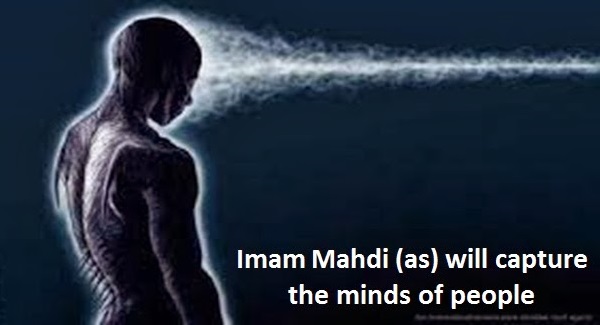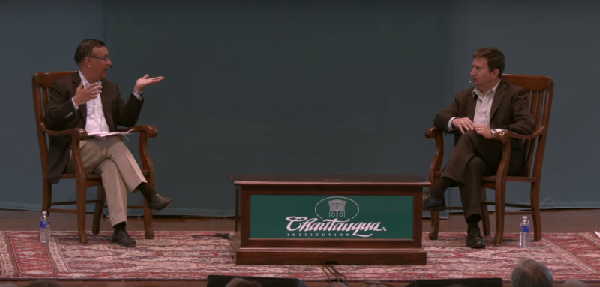Njdeh Asisian on Iranian eschatology at SWJ
Monday, May 9th, 2016[ by Charles Cameron — one selection from a much longer piece, followed by a CAVEAT LECTOR in red and a note about the Houthis ]
.
Mahdist image from a Haroun Yaha fansite in Pakistan — representing a Sunni variant eschatology in the school of Bediüzzaman Said Nursî, see Yahya’s official website, also an academic analysis of Yahya’s work at The Mahdi wears Armani — a distant cousin to the Shia and Sunni doctrines below
**
Okay, I posted the image above for its delightful AE Van Vogt science-fictionality. Now to the serious topic at hand.
Here’s the “Globalization and Eschatological-Apocalyptical Approach” section of Njdeh Asisian, Shia Iran and Effects of Globalization on State and Religion: The Beginning of Post-Islamism Era:
Eschatological-Apocalyptical analysts, without paying attention to what is going on within their own backyard, believe that the globalization provides tremendous opportunities for the expansion of the global reach of Shia Islam. The other side of this statement is also true when you read carefully between lines. The same Eschatological-Apocalyptical analysts believe that globalization negatively impacts the Islamic Republic because of its influence on Iranian civic society and the continuous weakening of the religious component of the Republic (Shia Islam). In other words, the Islamic Republic’s dilemma cannot be solved unless there is a global Islamic state where secularization and liberal-democratic forces have been defeated by the universal Islamization of the international political system. Consequently, the Islamization of global political system will also put an end to the liberal tendencies of Iranian people. The best possible model for such a scenario is the Soviet Union. With collapse of the Soviet Union, the Marxist-Leninist parties and even countries have collapsed, one after another, due to the failure of ideological legitimacy.
I will examine two types of “eschatological- apocalyptical” approaches to globalization. The first type is the realist approach in which adherents sought to prepare the ground for the political manipulation of the world order. The second type is to consider the globalization process through the Shia Eschatology.
The realist approach searches to find ways and means to establish a structure and thought process which will eventually bring into power an Islamic political and legal system as a dominant power on the world stage. In the realist opinion, the Iranian revolution of 1979 should serve as a serious basis of a new beginning for globalization of Islam as a major power broker in the international political system. They mentioned that, “From the beginning, the nature of revolution and the Islamic movement was based on the culture and return back to our original identity which was based on the religious doctrine. Therefore, we witnessed a fact that the Iranian Islamic Republic’s constitution highly praised the goal of having a global government which governs by Monotheism and hoists the banner of ‘There is no God but Allah’ in all over the world.”
At the same time, the realists promote the nature of global mission of the Iranian Revolution through the Iranian Constitution of 1979. In the constitution, religious identity and values are held in the highest possible place with the promise, made in the constitution, to assist all oppressed people around the world. They have envisioned the Iranian political system as the model for the future global Islamic order. At the same time, these Muslim intellectuals believe that they can offer something more important for human society, without rejecting the very essence of the globalization and technological advancements of our era.
The first step of the realists is to establish the legal framework for the future world order. They consider Islam as the engine of change on the global level and they mentioned that “now days the world turns to religion to fill the spiritual and emotional gaps; further, the world came to acknowledge that liberal-democracy is not useful and it tries to improve the situation through spirituality. This new trend produces a significant opportunity for different religions, and especially for Islam, in order to provide the masses with true teachings.” Further, Shia Jurisprudence is one that can bring serious and positive changes in human life because it has a global nature and it can implement it all over the word; therefore, “One of the distinguished features of Islam that makes it more applicable to the phenomenon of globalization is the existence of political Shia Jurisprudence. The special trait of political Shia Jurisprudence is that it turned Islam [automatically global]; Islam is a pro-active religion that is capable of answering all challenges that human beings can face.”
Besides the applicability of Islamic Jurisprudence at the global level which is theorized by religious scholars, Islamic Jurisprudence must be supported by sets of values that could be easily understandable and approachable by the masses. Therefore, the “Global Quranic Order is a desired system that had been promised to human beings. This system has structure and traits that is far different from the others. Creation of this Islamic Utopia is not possible unless [you] understand and recognize its peculiarities.” The most important pillars of this Islamic Utopia are “Global Quranic Order,” such as “Sovereignty belongs to God, Jurisprudence and Leadership, Unified Muslim Nation [Ummah], Unified Law [Fiqh], Justice, Rationality, Spirituality, Peace and Security, Good Life, Unified Language (Arabic as a Quranic language).”
The theory of Islamic globalization, as described above, is a world that its advocates want to create. They compare and contrast the current globalization with their own Quranic Order. “They do not reject the current technological advancement nor do they reject urbanization, industrialization, development, capitalism, science, and technology, and all that these imply for the organization of society. In this sense they are not anti-modern. They accept modernization, and the inevitability of science and technology and the changes in life-style they bring. However, and most importantly, they are unreceptive to the ideas that they say are Westernized.” They argued that the current Western-style globalization is based on false teachings. Therefore, globalization is taking the wrong route. “In the Alavi culture, technology is used for better living and the perfection of human beings and whatever improves the technological advancement is acceptable. In contrast, in the Western culture the technological advancements are used for profit and the capitalist culture is based on liberalism, individualism and hedonism which concluded in plunder of 99 percent of the population in favor of the 1 percent.”
The above mentioned Muslim scholars are providing theoretical grounds for an Islamic global government or empire. Naturally, these Muslim scholars resent the ideological part of globalization, where the liberal-democratic values have a dominant position in the global system. In other words, they want the technological advancements of the West without the ideology that is attached to it. A question arises here concerning what type of socio-economic system or platform they propose in order to keep up with the technological and economic creativity at the global level. It is obvious that no one can govern the world with just good wishes and ideology.
I move now from the realist theorists, who sought to establish an earthly Islamic Utopia, to the theocratic approach of Islamic globalization, where Shia Eschatology will change the world order beyond repair and establish a heavenly government on earth through the reappearance of the “12th Imam, Mehdi.”
In some Iranian writings regarding globalization and Islam, we see analysis that is a mixture of globalization theories, futurism, and the Shia Eschatology about the Mehdi. Muslims, regardless of whether they are Shia or Sunni, believe that one day the savior of the world or Lord of Ages, Mehdi, will appear in order to reestablish the justice, global governance and expanse of Islam all over the world.
In the Iranian case, we see the Shia version of Mehdi is somehow different from what Sunnis believe. The authors of these articles that call themselves “Mahdavist” have no faith in the current globalization processes. These authors are futuristic; they are analyzing international relations, geopolitics, socio-political relations, and economics of a society that does not exist, at least not yet. (Note: the other importance of this literature lies in the fact that the Iranian regime, due to its religious nature, cannot discount the religious belief system from interfering with what Kissinger called a Westphalian state that has specific commitments against the international community. However, many scholars and pundits do not look at the events in the Middle East through the lens of the religious belief system. Perhaps, this literature can assist them in understanding that the other side is preparing for an Eschatological end and even some activities may directly be connected to preparation for 12th Imams reappearance. The best example of this is Yemen. “Yemen plays a pivotal role in the Shia Eschatology”. Mahdavists have brought into Iranian globalization literature a phenomenon that is strictly religious. However, it is interesting to read and understand the religious scholars who are faithfully trying to analyze the religion through contemporary socio-political events. The other issue with these types of futuristic analysis is that there is no scientific literature or method that one can use to examine the validity of this claim. In other words, it is a religious belief system that one should accept by heart, rather than by scientific reason or methodology. The Mahdavists see the current globalization as a man-made phenomenon that has nothing to do with divine design for human beings.
They consider globalization as being empty of spirituality and human value and it is materialistic. In contrast they consider that real globalization will be achieved through the Mehdi’s revolt against the tyrannical order of the world. In the Mahdavist world, “The true definition of globalization is putting effort into building the world based on the Islamic teachings and governing the world through Islamic values. This goal is the undeniable promise of God. It is a message of the Quran, and the prophecy of prophets. On balance, wisdom of [the Islamic globalization] is doable. All man-made cultures and ideologies are condemned to total defeat and annihilation.”
Mahdavists believe that there is a close correlation between the reappearance of Mehdi and globalization. “The globalization that is based on liberalism, Omanism and secularism that propagated separation of church and state and rejected the system based on justice, is not acceptable for the global government of Mehdi. In contrast, the globalization that is acceptable is the one that does not pursue the domination of a specific culture, because all human beings are members of the global society. This type of globalization accepts multiculturalism, it accepts dialogue between civilizations, cultural understanding and access to shared values, mutual respect, international cooperation, and finally, the belief that global culture cannot swallow the other cultures, national or local”. Further, the global government of Mehdi cannot be considered as deterministic and cruel because it fulfills the prophet’s promises of global universal justice. Based on the Shia teachings, Mehdi will create a central government, a unified leadership and therefore, he will be able to end the main causes of conflict, wars and oppression.
In the final analysis, the universal Islamic government will establish the Islamic Jurisprudence that will put an end to religious and linguistic plurality where everyone is Muslim and speaks Arabic as the Quranic language. At the same time, the religious Eschatological-Apocalyptical approach does not produce a realistic analytical solution for the problems that Iran faces in the globalized world. This is because they are analyzing and looking for an unknown future and there is no set time for the reappearance of Mehdi.
**
I’m offering this here without much commentary, since I lack Farsi and access to the various quoted sources. This footnote, however, may be of interest:
Eschatology is a part of theology concerned with the final events of history, or the ultimate destiny of humanity. This concept is commonly referred to as the “end of the world” or “end time”. The word arises from the Greek eschatos meaning “last” and -logy meaning “the study of”, first used in English around 1550. The Oxford English Dictionary defines eschatology as “The department of theological science concerned with ‘the four last things: death, judgment, heaven and hell’.
**
CAVEAT:
I would however note this next footnote, and particularly the phrase, “According to our numerical analysis of the Quran”:
For Sunni Muslims, the Mahdi (Mehdi) is a unique Muslim leader who will appear in the End Times and act as a Caliph, ruling the Muslim World. According to our numerical analysis of the Quran, it seems that the Mahdi will be fulfilling a divine mission and will act as a Witness, a Warner and a Carrier of Good News, so he could be considered a Messenger.
This numerical anaysis appears to come from a site I’ve mentioned before [1, 2], Discovering Islam, which predicts:
The End Times: Based on Numerical Analysis of the Quran, Hadith, Arabic Words, and Historical Events.
Imam Mahdi in 2016
Jesus Christ (p) in 2022
I’d have to say that anyone quoting that site as though it is representative of Sunni Islam isn’t to be relied on for theological acumen. And that’s a serious defect, when writing about Shia Iran and Effects of Globalization on State and Religion
**
Finally — and bearing that caveat in mind — this footnote too may be of interest:
Based on the Shia Eschatology, the first group of people who will come to 12th Imam’s assistance are Yemenis. Currently the “Shia Houtis” of Yermen are trying to take over the government and establish a Shia state by Iranian assistance. As far as the Iranian theocratic elite concern, the sole purpose of the current Houtis’ agenda is to prepare for 12th Imam’s occultation which will take place in one of the Mosques in Makah Saudi Arabia. 12th Imam will be under siege in Makah until Yemenis come to his assistance. The Yemeni reinforcement will be the beginning of the 12th Imam’s journey.
And a minor point — just a typo — the Twelfth Imam’s occultation (ghayba) has already taken place: what is to be expected is his eventual return from occultation.








